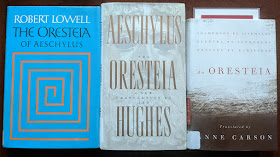In the resolution of Logicomix, the authors, who are participants in the story, attend a performance of the Oresteia....prompting me to re-read the trilogy by Aeschylus, which describes the murder of Agamemnon by his wife Clytemnestra, the revenge murder of Clytemnestra by their son, Orestes, and his trial for this murder, conducted in Athens by Athena, with the prosecution led by the implacable Furies and the defense led by Apollo, who originally revealed to Orestes that he must avenge his father's death.
I decided to read and compare three translations and this proved to be very interesting. Robert Lowell's was meant to be a very readable version in which he intended the three plays to be performed in one evening. In an Introduction, he explains that he did not (in this case) translate from the original Greek, but rather distilled and personalized translations by other poets - his version is thus simple and powerful. Hughes' translation is fuller and starker. Anne Carson was charged by an editor to create an unusual Oresteia by translating not the three plays by Aeschylus, but Agamemnon by Aeschylus, Elektra by Sophocles and Orestes by Euripides. This sequence by the three authors, written over a period of more than a hundred years, reflects some evolution in the traditional structure of the tragedy and also changes in Greek society.
One comparison shows the differences in style. When Agamemnon returns from Troy, he is greeted lavishly by Clytemnestra, who praises and honors him. Then she leads him into their home and, almost immediately, murders him. She then emerges from the house and is defiant toward the people and CHORUS:
Lowell:
Clytemnestra: You see I have lied to you and betrayed your king. So be it. I unsay my lies.
Hughes:
Clytemnestra: You heard me pronounce the words required by the moment. The moment has passed. Those words are meaningless.
Carson:
Clytemnestra: I said a lot of things before that sounded nice. I'm not ashamed to contradict them now.
Lowell is magisterial, Hughes is precise, and Carson is flip and energetic. Fun to compare!
I was particularly moved to read the trilogy because of my deep interest in two major societal issues. One is whether a country or society in which corruption is deeply entrenched can ever transform into a fairer system based on rules and merit. The other, dealt with explicitly in the Oresteia, is whether a society can ever durably overcome hatreds of long-standing based on deep divisions in, for example, religion or ethnicity. Wikipedia says "
The
principal themes of the trilogy include the contrast between revenge and justice,
as well as the transition from personal vendetta to organized litigation" and therefore I was eager to see how the trilogy addresses, and resolves, these conflicts. The Furies are resolute in their demand that Orestes be punished for the murder of his mother - and they bitterly promise revenge when they anticipate the possibility that Orestes may be found innocent. Indeed, when the vote of the jurors is tied and Athena then casts the decisive vote for acquittal, the Furies are (further) enraged and make terrible threats against Athens. How does Athena resolve this bitter, seemingly impossible dilemma? Interestingly, it's carrot and stick - a bit of stick and a lot of carrot. She first alludes to the fact that, as daughter of Zeus, she has the power to bring down thunderbolts upon the Furies if they do not cooperate. But her major approach is to offer the Furies an equal role in the governance and caretaking of Athens, saying (here in the beautiful poetry of Robert Lowell) that they will be honored and respected:
ATHENA:Old powers of darkness, you cannot complainthat a young Athena exiled you.If you can believe persuasion's in my voice,stay with us -- then you'll not afflict your host.FURY:What is this place you promised?ATHENA:One without sorrow and yoursFURY:If I take it, shall I have power?ATHENA:No house will prosper without you.FURY:Will I be stronger then?ATHENA:Yes.FURY:For a day or forever?ATHENA:Now and always.FURY:O queen, you are persuasion. I fear my hate is going.What song shall I sing in praise of our Athens?ATHENA:Say nothing of evil succeeding;sing of the land, the Aegean,mild breezes airinga landscape shot with sunlight,human seeds, all things that grow.All yours for the asking,as a gardener works for love.
In our time, a similar resolution between bitter enemies was that engineered by Nelson Mandela between the blacks and their former apartheid masters in South Africa - and here too the vehicle, The Truth and Reconciliation Commission, employed a bit of stick and a lot of carrot. Such outcomes are, however, rare in human history, as it seems almost impossible for us to set aside the weapons of revenge and instead offer the satisfaction of respect and shared power. Sigh.
